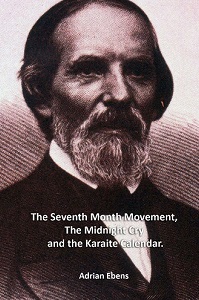Lessons from Matthew 24. The Destruction of Jerusalem—Its Meaning To-day
The Signs of the Times, November 21, 1900
AS to the destruction of Jerusalem, we have seen that it was false ideas of the Sabbath, set against the true, that caused the nation of the Jews to reject, to persecute, and to seek to kill Jesus, and that it was this rejection of Him that caused that destruction. They rejected and slew Him, lest the Romans should come and take away both their place and nation; and their rejection and slaying of Him resulted in the Romans coming and taking away both their place and nation. Their rejection of the Sabbath of the Lord, and in that rejection, the rejection of Him who was and is the Lord of the Sabbath, caused the ruin of that nation.
It is not necessary here to enter into the details of the destruction of Jerusalem and that nation; that is well know; and, besides, our study here is to discover what bearing that has on the great subject of the second coming of the Lord and the end of the world. Let us follow this subject to its conclusion.
An Instrument of Destruction.
The instrument of the destruction of Jerusalem and the nation of the Jews, was the Roman armies: "When ye therefore shall see Jerusalem encompassed with armies, then know that the desolation is nigh." The only armies that there were at that time were the Roman armies; for "the empire of the Romans filled the world."
And the Roman armies encompassing Jerusalem in fulfilment of the words of Jesus recorded by Luke (Luke 21:20), was "the abomination of desolation, spoken of by Daniel the prophet, standing in the holy place," in fulfilment of the words of Jesus recorded by Matthew. Matt. 24:15.
Now the abomination of desolation—the Roman power—spoken of by Daniel the prophet, when once it enters upon the scene of history and prophecy, continues unto the coming of the Lord and the end of the world.
Notice that in Dan. 7:7-11 he beheld in the vision a fourth beast, a fourth kingdom, which is Rome, "dreadful and terrible;" "the beast had also ten horns." As Daniel considered the horns, there came up "another little horn, before whom there were three of the first horns plucked up by the roots; and, behold, in this horn were eyes like the eyes of man, and a mouth speaking great things."
Daniel beheld this "little horn" in its working and its speaking, "until the Ancient of Days come," and "the judgment was set, and the books were opened." And at the time of the judgment says he, "I beheld then because of the great words which the HORN SPAKE: I beheld even till the BEAST was slain, and his body destroyed, and given to the burning flame."
Note that he was beholding the "little horn." He was considering the "little horn." At the time of the judgment he beheld especially because of the great words which the "horn spake." And he beheld even till—the horn was destroyed?—No, but till "the beast was slain, and his body destroyed, and given to the burning flame." This makes it perfectly plain that the "little horn" is but the continuation of the beast, in another form; so fully is the "little horn" a continuation of the spirit and characteristics and power of "the beast," that when comes the time of the destruction of the horn, instead of saying that the horn was destroyed, he says THE BEAST was slain and destroyed. And this makes it perfectly plain that when the beast enters upon the scene, he continues, only under another phase, until the coming of the Lord and the end of the world.
Again: In Dan. 8:9-12, 23-25, this same power is again symbolized by a "little horn which waxed exceeding great;" and it continues clear through till the end of the world, when it is "broken without hand" in the setting up of the kingdom of God, when the stone cut out without hand breaks in pieces and consumes all kingdoms of earth, and it stands forever. And in this prophecy of Daniel 8 this power is directly referred to as "the transgression of desolation;" while in Dan. 11:31; 12:11 the same power is definitely called "the abomination that maketh desolate." And in all these places the connection shows that it continues unto "the time of the end," and even unto the end.
And again: In Dan. 11:4 there is marked the concurrence of events which calls into the field of prophecy and history the Roman power. And when the Roman power does enter the field, the Word says that it is done "to establish the vision"—"the children of robbers shall exalt themselves to establish the vision." This shows that the Roman power was the great object of the vision; that whatever was given preceding the rise of that power, was given only as certain stepping-stones unto the time when that power should rise; and that when this power was met, in its rise, the object of the vision was met—the vision was established. And when that power is once entered upon the scene, it continues, if not in one phase then just as certainly in another, till the time of the coming of the Lord and the end of the world.
Therefore, when Jesus cited "the abomination of desolation spoken of by Daniel the prophet," in that very thing He brought to mind that which would continue unto the coming of the Lord and the end of the world. And when Jesus cited this power in His discourse upon the sign of His coming and of the end of the world, this certifies that in the career of that power there is that which is instructive as to His coming and the end of the world. And when He cited this power as the one which would betray Jerusalem, then this certifies that in the destruction of Jerusalem there is that which is instructive as to His coming and the end of the world.
Now it was their rejection of the Lord Jesus that brought upon that people the destruction of their city and nation by the Roman power—the abomination of desolation. And by the plain showing of the Gospels we have seen that it was in rejecting the divine idea of the Sabbath of the Lord that they rejected the Lord of the Sabbath, and persecuted Him, and sought to kill Him, until they had killed Him, to save the nation from the Romans, but which only caused the nation to be destroyed by the Romans.
And then, at a later date in its history, this Roman power, this abomination of desolation, at the time of the development of the "little horn" of Dan. 7:8—this power itself rejected God's idea of the Sabbath, and set up wholly man's idea of it; rejected the true Sabbath and set up a wholly false one, even to the substituting of another day—Sunday—for the Lord's day, the Sabbath day which God had established and appointed. It was said by those who did it, "All things whatsoever that was duty to do on the Sabbath day, these WE have transferred to the Sunday." Laws were enacted by the Roman power to compel all to accept the false idea of the Sabbath instead of the true. All who would observe the Sabbath of the Lord were "accursed from Christ," and whosoever did not accept the false, was held guilty of sacrilege and subject to penalties from the Roman power—the abomination of desolation.
And what was the consequence of this second course of rejecting the Sabbath of the Lord, and in that the Lord of the Sabbath? What came upon this second nation that did that thing?—It likewise was brought to ruin, and was swept from the earth as completely as was the nation of the Jews that first did that heaven-daring thing. The Roman Empire was as utterly ruined as was the Jewish nation.
A Lesson to the United States.
And now, in these last days, in these days when we know that the coming of the Lord "is near, even at the doors"—in these days "the abomination of desolation," the Roman power, exists in a different phase from that of the days of the destruction of Jerusalem, and also in a somewhat different phase from that of the days of the destruction of the Roman Empire. And in these days this abomination of desolation still insists upon that rejection of God's idea of the Sabbath, and the substitution of man's; the rejection of the true, and the acceptance, even by force, of the false. And in this heaven-daring thing, in this thing which has twice wrought, as a world-example, the ruin of nations, the abomination of desolation has gained the support of THE UNITED STATES.
The United States, as certainly as ever did Jerusalem, or as ever did Rome, has rejected God's idea of the Sabbath, and has accepted man's—"the man of sin;" it has rejected the true, and has set up the false, to be forced upon all people by the power of the State. In her legislation of 1893, God's idea of the Sabbath was read in His own words from His own Word, and then that was deliberately set aside and rejected, and one utterly false in every respect was accepted and established here by governmental recognition. This nation, as really as did Jerusalem, or as did Rome, in thus rejecting the Sabbath of the Lord, has in this rejected the Lord of the Sabbath.
And what must be the consequence? What only can be the consequence? Can this nation now fare any better than fared Jerusalem and Rome in doing the same thing? Can it be fairly hoped that she can fare as well as did they, since she has done this thing in the face of these two world-warning destructions? But how shall destruction come here for this heaven-daring offense? It came to Jerusalem by the Roman power. It came to the Roman Empire by the barbarians of the North. Whence can it come next in punishment of this offense of the king?—It comes in the brightness of the consuming glory of the coming of the Lord, and the armies of heaven following Him upon white horses, when out of His mouth goeth the sharp sword with which He shall smite the nations. Rev. 19:11-21; Joel 2:1-11. And this is why it is that the destruction of Jerusalem is a sign to the people of the United States to-day, and why it is a sign of the coming of the Lord and of the end of the world.
And when the "abomination of desolation," as it is to-day, Rome, as it is in its latest phase, shall have gathered to her principles and under her influence all the nations; and when, by the example, and power, and influence of the United States the abomination of desolation shall have done this only the more effectually; and when by the power thus regained the abomination of desolation shall have accomplished once more and finally for her, to scatter the power of the holy people, and shall have made as effectual as possible the rejection of the Sabbath of the Lord, and in that the Lord of the Sabbath; then it is written, "All these things shall be finished." Dan. 12:7. And as that power will be universal, so the destruction will be universal—and this at the coming of the Lord; for this "abomination of desolation," this "man of sin," this "mystery of iniquity," is to be consumed "with the spirit of His mouth," and is to be destroyed "with the brightness of His coming."
And this is why it is that the destruction of Jerusalem is instructive of warning to all the people of the world to-day. And this is why it is that the destruction of Jerusalem is a sign, amongst the other "signs," of the coming of the Lord and the end of the world.
And now is the time. "Get ready! get ready! get ready!"
ALONZO T. JONES.





